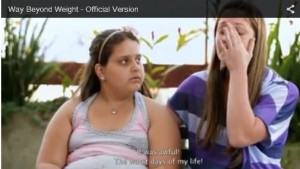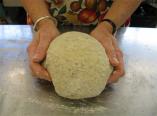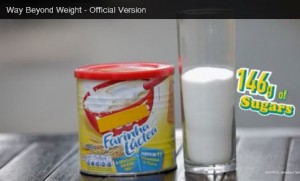Today’s class was about pediatric nutrition, and inevitably, we entered into discussions about obesity: how malnourished mothers give birth to the same problems in their babies as did those in the Dutch Famine Birth Cohort Study. That malnourishment nowadays is, of course, not necessarily tied to a lack of food, but to a lack of nutrients, which produces babies with impaired cognitive, functional and immune systems. The children are likely, like those in the Dutch study, to struggle with a life-long legacy of neural tube defects, schizophrenia, infertility, cancer, cardiovascular disease, respiratory dysfunctions, and obesity. And the issues persist into subsequent generations: their own children are likely to have shorter lives than normal.
 Now that obesity rates have reached 1 billion in the developing world, it was timely to come upon Way Beyond Weight, a Brazilian documentary looking at obesity in children. Thanks to globalization of junk food, the story was much the same in Brazil as it would have been anywhere in the long-industrialized world.
Now that obesity rates have reached 1 billion in the developing world, it was timely to come upon Way Beyond Weight, a Brazilian documentary looking at obesity in children. Thanks to globalization of junk food, the story was much the same in Brazil as it would have been anywhere in the long-industrialized world.
The lives of these lonely overweight youngsters are already blighted by illnesses they are not old enough to understand or manage. The grim little titles that identify the conditions of the children interviewed – diabetes, thrombosis, arthritis and high cholesterol – hang in the memory as we witness their food choices: sodas, chocolate, chips, juice and cookies. One child confesses how often she fails to test her blood sugar and inject herself with insulin; another has a full-blown tantrum until his worn parents hand over the package of chips he’s after. Most are unable to identify common vegetables, but are experts in naming brands of junk food and directing their parents’ “food” buying patterns. McDonald’s and Nestle take a bow, showing the damage they can inflict through promotional toys and floating junk food supermarkets respectively.
The proud, loving and anguished parents are as bewildered as their offspring: they wean their babies early and switch to high-sugar infant formula, misread nutrition labels, and stare stupefied at the amount of sugar and fat their children’s favourite snacks contain. The health officer and tribal chief of one indigenous village explains how to prepare the instant noodles which he soberly opines are a healthy food. There are other wry moments too: the biologist who took a bite from a cupcake some school children were snacking on and who shows that it has not rotted or grown mouldy in the year and a half since; the school cook who admits that the only part of the meals she actually cooks is rice or noodles: the rest comes from cans.
Many experts lend their voices to the film; some Brazilian, others familiar to North American food watchers: Jamie Oliver and Ann Cooper both figure. In the end, the most optimistic observation, by advertising whiz Alex Bogusky, is that our consumer dollar is the only thing that can cause change. To the mothers who observed that their local store does not even stock fruits or vegetables, that will not seem like much of a solution.











